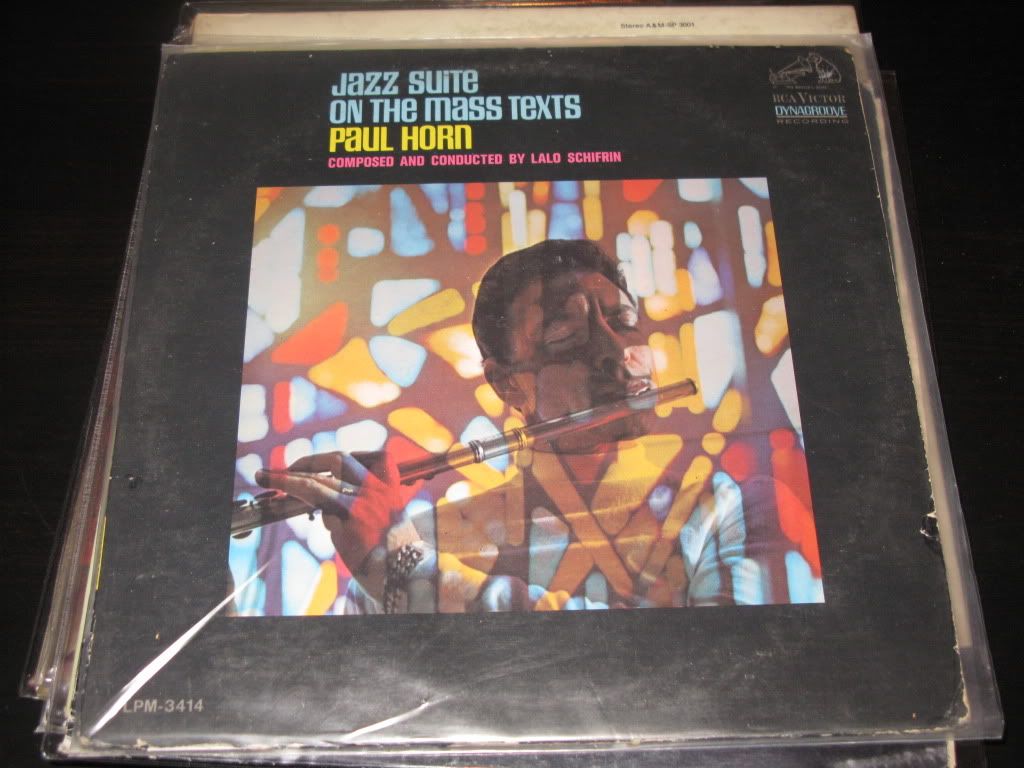It's Sunday so I thought I'd pull out some Christian jazz.
Apparently this is the first jazz mass, recorded in 1964 by Paul Horn under the direction of Lalo Schifrin. In fact Schifrin arranged the traditional ecclesiastical music, conducted the orchestra and produced the record- so in many ways its more of a Schifrin record than a Horn one!
Schifrin and Horn were trying something that initially when I bought this record, seemed pretty strange but, on reflection, is perhaps is not so strange.
My initial thoughts were that religion and jazz just don't mix. After all, isn't jazz the product of music played in bordellos and gambling dens? Likes the blues, isn't it music for a Saturday night rather than for a Sunday service? Like pop music there is something deliciously bad about jazz, the music that the cool kids listened to, the music that went with late nights, lots of alcohol, maybe lots of drugs, maybe sex, maybe all of the things that your pastor would disapprove of in church.
Charlie Parker didn't start jazz musicians taking drugs but his musical ability and inventiveness made a lot of people wonder if, by adopting his lifestyle, they could capture a part of what he had. The answer was invariably, a big fat no. But the number of successful jazz musicians who battled drugs is legion.
So jazz is often aligned with some pretty unconventional and frankly non-religious behaviour.
But then again in the early 60s what was happening in jazz, and lots of other music, was lending itself to a great deal of spirituality. Listen to Coltrane's early 60s records and then his wife Alice and Pharaoh Sanders. Listen to as slew of 60s musicians in many genres who were looking to the east, to spirituality, to transcendence, to belief.
So maybe in the early 60s Christianity wasn't that cool - but thinking that there was something else out there was not so weird.
I'm not sure if its at all relevant to a record that mixes jazz with Christian music but, in 1963 a man of the cloth called Martin Luther King Jr went to Washington and gave a small speech about racial equality. The civil rights movement was intrinsically linked to the Afro-American Baptist church.
Also, in 1964 the idea of merging jazz with classical music, the so-called Third Stream, was very current.
Miles Davis had recorded Sketches of Spain in 1960, the Modern Jazz Quartet were at the height of their popularity with their chamber jazz and jazz groups containing all manner of classical instruments, cellos, french horns or oboes were springing up everywhere, particularly on the West Coast. Both Horn and Schifrin were connected to some of the composers and musicians involved with the Third Stream.
So one might expect the music on this record to be polite and perhaps slightly staid.
It is in fact nothing of the sort.
To be honest, its a record that I don't put on the turntable that often. There is something very serious about this music. Serious because it is religious music but also serious because it is music that is exploring and probing and questioning.
One can, I think, hear elements of Schifrin's future cinema work, and Horn's future new age stuff. And at times I can't help but think about Gerry Goldsmith's score for the Omen.
Schifrin's arrangements are pleasingly beat heavy and very full and 'wall of sound'.
Horn's playing - albeit it brought to the front of the mix - is only one element of the music. Names you might recognise who are on the record are Bill Plummer, Larry Bunker, Red Callender and Emil Richards.
Does it urge me to go into a church? Frankly no.
But at times the music is very beautiful and moving. Schifrin manages to bring some of the emotion of the church to the record while not straying too far from recognisable jazz; and at time, particularly on Credo, the music goes into some very experimental territory.
Not something to put on if you are feeling a bit fragile on a Sunday morning. But if you want something to blow the cobwebs away before a relaxed Sunday, this could be the one for you.

I love this LP. Have you heard Horn's 'Cleopatra' album?
ReplyDeleteYou mean the one with a very buxom Elizabeth Taylor on the front?
ReplyDeleteYes I have, and very fine it is too
Possibly more experimental than Jazz Suite but I'm not sure its more enjoyable
Will pull it out and give it an airing here when I get a chance